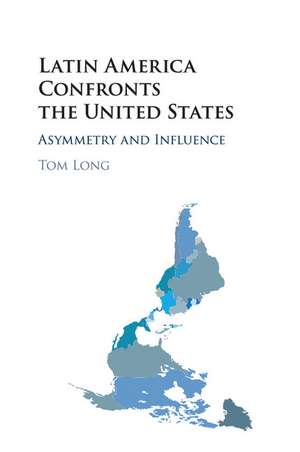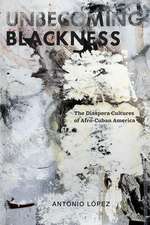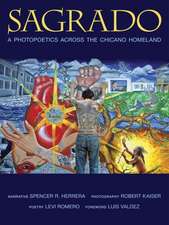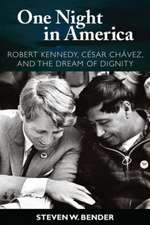Latin America Confronts the United States: Asymmetry and Influence
Autor Tom Longen Limba Engleză Paperback – 14 iun 2017
| Toate formatele și edițiile | Preț | Express |
|---|---|---|
| Paperback (1) | 224.06 lei 6-8 săpt. | |
| Cambridge University Press – 14 iun 2017 | 224.06 lei 6-8 săpt. | |
| Hardback (1) | 699.63 lei 6-8 săpt. | |
| Cambridge University Press – 18 noi 2015 | 699.63 lei 6-8 săpt. |
Preț: 224.06 lei
Nou
Puncte Express: 336
Preț estimativ în valută:
42.87€ • 44.77$ • 35.40£
42.87€ • 44.77$ • 35.40£
Carte tipărită la comandă
Livrare economică 15-29 aprilie
Preluare comenzi: 021 569.72.76
Specificații
ISBN-13: 9781107547056
ISBN-10: 1107547059
Pagini: 272
Dimensiuni: 151 x 230 x 20 mm
Greutate: 0.4 kg
Editura: Cambridge University Press
Colecția Cambridge University Press
Locul publicării:New York, United States
ISBN-10: 1107547059
Pagini: 272
Dimensiuni: 151 x 230 x 20 mm
Greutate: 0.4 kg
Editura: Cambridge University Press
Colecția Cambridge University Press
Locul publicării:New York, United States
Cuprins
1. Asymmetry, influence, and US-Latin American relations; 2. Operação Pan-Americana: fighting poverty and fighting Communism; 3. Completing the nation: Omar Torrijos and the long quest for the Panama Canal; 4. A recalculation of interests: NAFTA and Mexican foreign policy; 5. An urgent opportunity: the birth of Plan Colombia; 6. Conclusions; References.
Recenzii
'With compelling evidence and theoretical clarity, Long offers a much needed reinterpretation of inter-American relations, suggesting that Latin American countries, whether large or small, have agency - when armed with ideas, leadership, and clever strategies - and that they can effectively penetrate the decentralized, fragmented US foreign policy process to influence outcomes and advance their national interests.' Richard Feinberg, University of California, San Diego
'Tom Long's Latin America Confronts the United States: Asymmetry and Influence is a fresh and significant contribution. Drawing on careful research about four major cases of US policy toward Latin America over the past five decades, Long shows that much of the impetus for these policies came from Latin America, not from Washington. Previous accounts exaggerate the degree of autonomous policy determination by the United States and underestimate the influence of Latin American drivers, strategies, and pressures. Long's emphasis on the interaction between multiple Latin American actors and the fragmented processes of US policy making should become a paradigm for future analysis.' Abraham Lowenthal, University of Southern California
'… a landmark study that both helps us understand the dynamics of contemporary US-Latin American relations and contributes significantly to the fields of comparative politics and international relations … Dr Long's detailed, meticulously researched study demonstrates that the conventional wisdom about compliant Latin American states mischaracterized the nature of the asymmetrical relationships since at least the 1950s. [This book] provides a complex, nuanced, and compelling analysis that demonstrates Latin Americans have long been agents of their own history, not mere puppets of the United States … Dr Long's clear articulation of the way this study departs from prior analyses of US-Latin American relations and from prevailing conceptions about power and asymmetry in the international system enables Latin America Confronts the United States to serve as an instructive model of how an internationalist approach can deepen and change our understanding of global relations in a world characterized by asymmetry … offers important policy implications as well as theoretical insights.' Philip Brenner, American University, Washington DC
'Aside from providing detailed and engaging historical accounts of the cases above, Long makes some interesting points vis-à-vis the dynamics shaping asymmetrical relations between great powers and weaker ones, arguing that Latin America has exercised more influence in US-Latin America relations that is normally understood. … The second case, perhaps the book's most remarkable, explains how Omar Torrijos, dictator of one of the hemisphere's smallest countries, shrewdly used postcolonial rhetoric and international institutions to convince the United States to hand over control of the Panama Canal, something US foreign policy makers were strongly opposed to at first. … The case sheds particular light on the ways in which weaker-state leaders can use international institutions in pursuit of their objectives, as well as the role weaker states can play in affecting the political agendas of larger ones.' Oliver Stuenkel, Fundação Getúlio Vargas, Brazil
'[Long's] argument is that Latin American foreign policy initiatives have received too little attention, and that they've been strikingly successful in setting the political agenda and achieving policy goals. He uses detailed case studies Operation Pan American, the Panama Canal treaties, the North American Free Trade Agreement, and Plan Colombia. … [The book] is based on some excellent fieldwork, with extensive archival research and interviews with key participants. So beyond the analysis itself, it's an interesting read.' Greg Weeks, University of North Carolina, Charlotte
'Long joins a growing list of scholars who have challenged the deeply held assumption that hegemonic U.S. power has left little space for Latin American countries to take the initiative in their relationships with Washington. He demonstrates that in fact, when dealing with the United States, capable Latin American leaders have not only successfully defended their interests but also astutely intervened in U.S. domestic politics to alter the way that Washington defines and pursues its interests in the region.' Richard Feinberg, 'The Best of Books 2016', Foreign Affairs
'Making extensive use of archival sources in and outside the US, as well as in-depth elite interviews with key protagonists across the hemisphere, Long convincingly argues not only that the US did not always get its own way, but also that it is possible for presumably powerless countries in the region to move US policy. … This book is an excellent contribution to our understanding of US–Latin American relations and an important read for anyone interested in this area.' Sean W. Burges, International Affairs
'… the book provides a fresh look at a discussion that is often dominated by Latin American worries about US intervention, with little attention paid to ways for Latin America to exercise influence in the United States. … Long's book thus provides an important analysis for Latin American scholars, but also for those studying regional dynamics elsewhere, for example in Asia, where China's growing influence is an ever more important topic.' Oliver Stuenkel, International Journal
'University of Reading professor Tom Long reminds us in his thorough, well-researched book, Latin America Confronts the United States, bringing NAFTA into being required cagey planning and execution by Mexican politicians such as presidents Miguel de la Madrid (1982–88) and Carlos Salinas de Gortari (1988–94). Professor Long thinks that these technocratic leaders saw NAFTA as a way not just to solidify their country's shift away from nationalist economic policies but also to lock in its concomitant strategic pursuit of stronger relations with the long-suspected gringo colossus to the north.' Russell Crandall, Survival: Global Politics and Strategy
'His work supports an 'internationalist' approach to the study of US–Latin American relations which argues that Latin American actors were not superpower puppets but able to influence the course of events in their own region as well as US behaviour. It also develops the argument that weaker states in asymmetrical relations can exercise a greater degree of influence in international affairs than a focus on the purely material capabilities of the individual actors might suggest.' Gavin O'Toole, Latin American Review of Books
'Whether or not one agrees with its conclusions, this book in a fundamental contribution to understanding the relations between the United States and Latin America and the Caribbean; via a complex approach, it recognizes both the profound asymmetries between the United States and its neighbors to the south and strives to show how non-central countries can still exercise a certain capacity of influence on the most powerful.' Leandro Morgenfeld, translated from Observatorio Latinoamericano y Caribeño
'Tom Long's book does stand out for its analytical rigor and should pave the way for more theoretically motivated scholarship on US–Latin American relations.' Dexter Boniface, Latin American Research Review
'Tom Long's Latin America Confronts the United States: Asymmetry and Influence is a fresh and significant contribution. Drawing on careful research about four major cases of US policy toward Latin America over the past five decades, Long shows that much of the impetus for these policies came from Latin America, not from Washington. Previous accounts exaggerate the degree of autonomous policy determination by the United States and underestimate the influence of Latin American drivers, strategies, and pressures. Long's emphasis on the interaction between multiple Latin American actors and the fragmented processes of US policy making should become a paradigm for future analysis.' Abraham Lowenthal, University of Southern California
'… a landmark study that both helps us understand the dynamics of contemporary US-Latin American relations and contributes significantly to the fields of comparative politics and international relations … Dr Long's detailed, meticulously researched study demonstrates that the conventional wisdom about compliant Latin American states mischaracterized the nature of the asymmetrical relationships since at least the 1950s. [This book] provides a complex, nuanced, and compelling analysis that demonstrates Latin Americans have long been agents of their own history, not mere puppets of the United States … Dr Long's clear articulation of the way this study departs from prior analyses of US-Latin American relations and from prevailing conceptions about power and asymmetry in the international system enables Latin America Confronts the United States to serve as an instructive model of how an internationalist approach can deepen and change our understanding of global relations in a world characterized by asymmetry … offers important policy implications as well as theoretical insights.' Philip Brenner, American University, Washington DC
'Aside from providing detailed and engaging historical accounts of the cases above, Long makes some interesting points vis-à-vis the dynamics shaping asymmetrical relations between great powers and weaker ones, arguing that Latin America has exercised more influence in US-Latin America relations that is normally understood. … The second case, perhaps the book's most remarkable, explains how Omar Torrijos, dictator of one of the hemisphere's smallest countries, shrewdly used postcolonial rhetoric and international institutions to convince the United States to hand over control of the Panama Canal, something US foreign policy makers were strongly opposed to at first. … The case sheds particular light on the ways in which weaker-state leaders can use international institutions in pursuit of their objectives, as well as the role weaker states can play in affecting the political agendas of larger ones.' Oliver Stuenkel, Fundação Getúlio Vargas, Brazil
'[Long's] argument is that Latin American foreign policy initiatives have received too little attention, and that they've been strikingly successful in setting the political agenda and achieving policy goals. He uses detailed case studies Operation Pan American, the Panama Canal treaties, the North American Free Trade Agreement, and Plan Colombia. … [The book] is based on some excellent fieldwork, with extensive archival research and interviews with key participants. So beyond the analysis itself, it's an interesting read.' Greg Weeks, University of North Carolina, Charlotte
'Long joins a growing list of scholars who have challenged the deeply held assumption that hegemonic U.S. power has left little space for Latin American countries to take the initiative in their relationships with Washington. He demonstrates that in fact, when dealing with the United States, capable Latin American leaders have not only successfully defended their interests but also astutely intervened in U.S. domestic politics to alter the way that Washington defines and pursues its interests in the region.' Richard Feinberg, 'The Best of Books 2016', Foreign Affairs
'Making extensive use of archival sources in and outside the US, as well as in-depth elite interviews with key protagonists across the hemisphere, Long convincingly argues not only that the US did not always get its own way, but also that it is possible for presumably powerless countries in the region to move US policy. … This book is an excellent contribution to our understanding of US–Latin American relations and an important read for anyone interested in this area.' Sean W. Burges, International Affairs
'… the book provides a fresh look at a discussion that is often dominated by Latin American worries about US intervention, with little attention paid to ways for Latin America to exercise influence in the United States. … Long's book thus provides an important analysis for Latin American scholars, but also for those studying regional dynamics elsewhere, for example in Asia, where China's growing influence is an ever more important topic.' Oliver Stuenkel, International Journal
'University of Reading professor Tom Long reminds us in his thorough, well-researched book, Latin America Confronts the United States, bringing NAFTA into being required cagey planning and execution by Mexican politicians such as presidents Miguel de la Madrid (1982–88) and Carlos Salinas de Gortari (1988–94). Professor Long thinks that these technocratic leaders saw NAFTA as a way not just to solidify their country's shift away from nationalist economic policies but also to lock in its concomitant strategic pursuit of stronger relations with the long-suspected gringo colossus to the north.' Russell Crandall, Survival: Global Politics and Strategy
'His work supports an 'internationalist' approach to the study of US–Latin American relations which argues that Latin American actors were not superpower puppets but able to influence the course of events in their own region as well as US behaviour. It also develops the argument that weaker states in asymmetrical relations can exercise a greater degree of influence in international affairs than a focus on the purely material capabilities of the individual actors might suggest.' Gavin O'Toole, Latin American Review of Books
'Whether or not one agrees with its conclusions, this book in a fundamental contribution to understanding the relations between the United States and Latin America and the Caribbean; via a complex approach, it recognizes both the profound asymmetries between the United States and its neighbors to the south and strives to show how non-central countries can still exercise a certain capacity of influence on the most powerful.' Leandro Morgenfeld, translated from Observatorio Latinoamericano y Caribeño
'Tom Long's book does stand out for its analytical rigor and should pave the way for more theoretically motivated scholarship on US–Latin American relations.' Dexter Boniface, Latin American Research Review
Notă biografică
Descriere
Using multinational sources, the book explores how Latin American leaders influenced US policy in the context of asymmetrical power relations.












